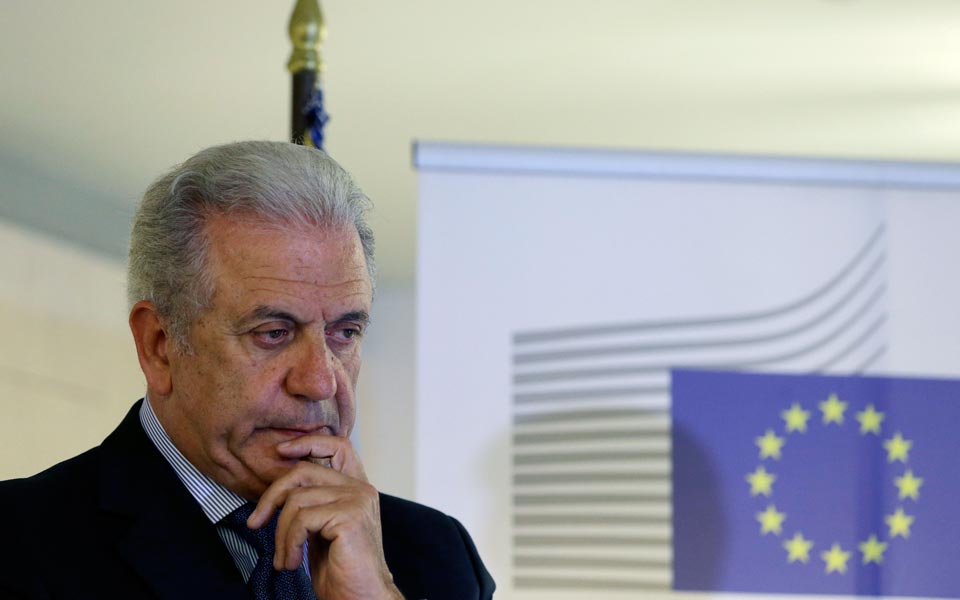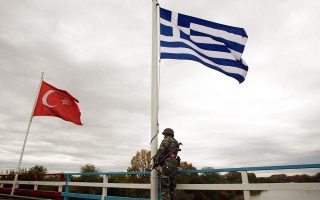Divided EU seeks to avoid migrant ‘humanitarian crisis’

European interior ministers tried Thursday to resolve deep divisions over the migrant crisis, with Greece lashing out at its partners for creating a humanitarian crisis and officials warning the EUs unity was at stake.
Athens is seething over a series of border restrictions by Austria, Former Yugoslav Republic of Macedonia (FYROM) and Serbia along the migrant trail to northern Europe that has caused a bottleneck in Greece, the main entry point to Europe.
Migration commissioner Dimitris Avramopoulos urged ministers to find a solution, warning that the 28-nation bloc's survival was at stake as states were increasingly acting without consulting their neighbours.
“Lonely initiatives do not lead anywhere. Now, the unity of the union and human lives are at stake,” he told reporters as he arrived for the talks in Brussels.
Thursday's Brussels meetings started with a working breakfast between ministers from non-EU Serbia and FYROM, and the EU countries on the Balkans route, while a Turkish official was to join the full meeting of all 28 EU states.
The crisis caused by refugees and migrants from Syria, the Middle East and Africa shows no signs of abating with. 100,000 people arriving in Europe so far this year on top of one million in 2015.
Ahead of the talks, Greek Prime Minister Alexis Tsipras threatened not to cooperate with future EU agreements on the migrant crisis if the burden was not fairly shared among member states.
”Greece will not accept becoming Europe’s Lebanon, a warehouse of souls, even if this were to be done with major (EU) funding,” Greek migration minister Yannis Mouzalas told reporters in Brussels.
Lebanon hosts around a quarter of the four million Syrians who have fled to neighbouring countries.
“A very large number (of participants) here will attempt to discuss how to address a humanitarian crisis in Greece that they themselves intend to create,” Mouzalas added.
But the rest of the EU is putting pressure on Greece to stop “waving through” migrants, warning that if there is no progress by the time of an EU-Turkey summit on March 7 then they will have to take sterner action.
The Brussels talks come a day after Austria warned the EUs future was at stake at a meeting of Balkan states in Vienna from which an angry Greece was excluded, and after Hungary announced a referendum on refugee quotas.
The crisis ratcheted up at the weekend after FYROM closed its Greek border to Afghans because countries further up the route were turning back groups from that country.
On Thursday Austrian interior minister Johanna Mikl-Leitner raised the possibility of Greece’s exclusion from Europe’s Schengen passport-free travel zone, which is cracking as more and more countries reintroduce border controls.
”If it is really the case that the Greek external border cannot be protected, can it be still a Schengen external border?” she said. “If Greece is not able or ready to protect its external borders, others have to take the helm.” The EUs hopes are largely resting on a three-billion-euro ($3.2 billion) deal signed with Turkey in November to cut the flow of migrants to Greece, with progress to be examined at next month's Brussels-Ankara summit.
German interior minister Thomas De Maziere warned that it was the last chance before Europe had to take more drastic steps, especially given the large numbers still coming via Greece.
“If a solution by the 7th of March is not possible, there have to be other European and coordinated measures,” he said.
A further row broke out between Paris and Brussels after Belgium decided to impose checks at the border with France to stop people coming from the “Jungle” migrant camp in Calais.
”This decision is a strange one, just as is its motivation,” French Interior Minister Bernard Cazeneuve told reporters.
The European Commission, the executive arm of the EU, said on Tuesday it was “coordinating a contingency planning effort, to offer support in case of a humanitarian crisis both outside and within the EU”.
[AFP]





